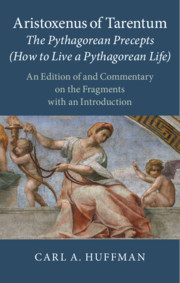Aristoxenus of Tarentum: The Pythagorean Precepts (How to Live a Pythagorean Life) An Edition of and Commentary on the Fragments with an Introduction
Langue : Anglais
Coordonnateur : Huffman Carl A.

The first detailed study of The Pythagorean Precepts, which present the Pythagorean way of life praised by Plato.
The Pythagorean Precepts by Aristotle's pupil, Aristoxenus of Tarentum, present the principles of the Pythagorean way of life that Plato praised in the Republic. They are our best guide to what it meant to be a Pythagorean in the time of Plato and Aristotle. The Precepts have been neglected in modern scholarship and this is the first full edition and translation of and commentary on all the surviving fragments. The introduction provides an accessible overview of the ethical system of the Precepts and their place not only in the Pythagorean tradition but also in the history of Greek ethics as a whole. The Pythagoreans thought that human beings were by nature insolent and excessive and that they could only be saved from themselves if they followed a strictly structured way of life. The Precepts govern every aspect of life, such as procreation, abortion, child rearing, friendship, religion, desire and even diet.
Part I. Introduction: 1. Evidence for the work: the excerpts preserved in Stobaeus; 2. Title and nature of the work; 3. Format and style of the work; 4. Fragments of the Pythagorean Precepts preserved in Iamblichus' On the Pythagorean Way of Life; 5. A comparison of Stobaeus' and Iamblichus' evidence for the Pythagorean Precepts; 6. Relationship of the Pythagorean Precepts to Aristoxenus' other works on the Pythagoreans; 7. The influence of the Pythagorean Precepts on the later Pythagorean tradition; 8. History of scholarship on the Pythagorean Precepts; 9. The standard view of the Pythagorean Precepts; 10. The ethical system of the Pythagorean Precepts; Part II. Fragments with Translation and Commentary: 11. The Pythagorean Precepts: a reconstructed text in English; 12. Fragment 1: obedience to parents and the laws (fr. 34 Wehrli = Stobaeus, 4.25.45); 13. Fragment 2: the importance of order and supervision for every age of life (fr. 35 Wehrli = Stobaeus, 4.1.49); 14. Fragment 3: desire (fr. 37 Wehrli = Stobaeus, 3.10.66); 15. Fragment 4: the generation of children (fr. 39 Wehrli = Stobaeus, 4.37.4); 16. Fragment 5: the love of what is beautiful and fine (fr. 40 Wehrli = Stobaeus, 3.1.101); 17. Fragment 6: learning must be willing (fr. 36 Wehrli = Stobaeus, 2.31.119); 18. Fragment 7: luck (fr. 41 Wehrli = Stobaeus, 1.6.18); 19. Fragment 8: human nature is prone to excess and needs the supervision of the gods, parents and laws (fr. 33 Wehrli, Iamblichus, VP 174-6); 20. Fragment 9: opinion, the training of children and young people, pleasure, desire, diet, and the generation of children (fr. 38 Wehrli, Iamblichus, VP 200-13); 21. Fragment 10: the appropriate and the inappropriate in human interaction. On starting points and rulers (Iamblichus, VP 180-3); 22. Fragment 11: friendship (Iamblichus, VP 101-2, 230-3); Part III. Appendices: 23. Subsidiary Precepts 1: avoid crowds in the morning, and 2: avoid hunting (Iamblichus, VP 96-100); 24. Subsidiary Precept 3: memory (Iamblichus, VP 164); 25. Subsidiary Precept 4: all sex is harmful (Diodorus Siculus, Library of History 10.9.3); 26. Stobaeus, Eclogae 3.1.71: divination, medicine, and music.
Carl A. Huffman is Research Professor and Emeritus Professor of Classical Studies at DePauw University, Indiana. He is author of Archytas of Tarentum: Pythagorean, Philosopher, and Mathematician King (Cambridge, 2005) and Philolaus of Croton: Pythagorean and Presocratic (Cambridge, 1993) and editor of A History of Pythagoreanism (Cambridge, 2014). He is author of the articles on Pythagoras and Pythagoreanism for the on-line Stanford Encyclopedia of Philosophy and is one of the leading authorities in the world on ancient Pythagoreanism. He has been awarded fellowships by The Howard Foundation, The National Endowment for the Humanities, and The John Simon Guggenheim Foundation. He also received a fellowship from the American Council of Learned Societies, which he held while a Visitor at the Institute for Advanced Studies in Princeton, New Jersey.
Date de parution : 10-2019
Ouvrage de 646 p.
14.4x22.3 cm
Disponible chez l'éditeur (délai d'approvisionnement : 14 jours).
Prix indicatif 183,14 €
Ajouter au panierThème d’Aristoxenus of Tarentum: The Pythagorean Precepts ... :
© 2024 LAVOISIER S.A.S.



